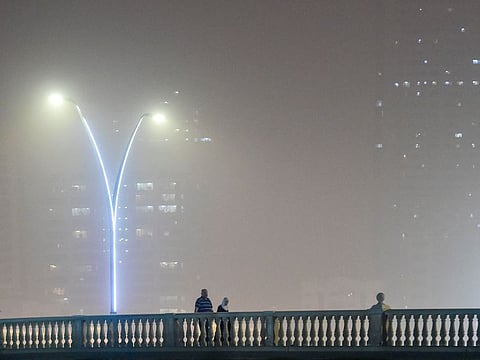Watch: Sandstorm in UAE - How to avoid allergies, respiratory attacks
Doctors share advice on keeping ailments at bay during dusty weather

Dubai: Nina Peters, a Dubai resident who suffers from asthma, is not taking any chances of exposure to the dusty weather that the UAE is experiencing currently. A COVID-19 survivor, she is wearing a mask and working from home. The heat, humidity and sand particles in the air make the perfect cocktail to exacerbate her asthma and she has decided to stay indoors for the entire week. Like Peters, many other UAE residents are playing safe and erring on the side of caution.
With the present dust storm sweeping over UAE and the forecast by the National Centre of Meteorology (NCM) of it lasting some more days, pulmonologist and family medicine specialists are advising residents to take extra precautions to protect their upper respiratory tracts and lungs.
Vulnerable groups
Pulmonologists in the UAE said they had begun receiving the first few patients of asthma and respiratory distress since the weather changed and were expecting cases from the vulnerable category such as school children, senior citizens and those with pre-existing asthma or upper respiratory tract weakness.
Dr Sandeep Pargi, specialist pulmonologist at Aster Hospital in Mankhool, said the most important aspect of sand storms that poses a respiratory health threat for all is the suspended particle of dusts in the air.

How sand particles trigger respiratory distress
Describing how the storm impacted the upper respiratory tract, Dr Ali Anwar Mohammad, Specialist Pulmonologist at Prime Hospital said: “The sand particles suspended in the air contain silica and carry microbes of viruses, bacteria, fungal spores and even some plant residues. These affect the eyes, nose and upper respiratory tract resulting in itchy eyes, conjunctivitis, and mucous production from nose and throat owing to the itchiness and irritation."

Doctor’s advice
So, how can residents take precautions?
First, Dr Mohammed said, they must avoid stepping outdoors. “Remaining indoors will cut back on the trigger catalysts and cut their risk of respiratory distress by half. Secondly, if they do need to step out, they must wear a mask to filter out the fine sand.”
While indoors, it is best to be in air-conditioned rooms and have air-conditions serviced well. Dr Mohammad said: “Air conditioner of all kinds have layers of filters which prevent sand from coming in. Every summer, the filters need to be cleaned, washed and all residues of sand that might contain fungal spores must be cleaned out. Air conditions are effective in keeping the heat and humidity out of the homes, keeping it dry and sterile. Therefore, people must make sure these machines are annually serviced, to prevent sand particles and other potentially dangerous microbes from getting indoors. Being in this kind of air-conditioned rooms is the safest bet for now.”
Also Read: Watch: UAE sand storm - How to drive safely
Dos and don’ts
• Avoid stepping out in the heat and dust conditions as far as possible. The humidity can cause difficulty in breathing while the fine sand particles can trigger serious respiratory infections
• If you must venture out, make sure to wear a face mask. While masks cannot help in lowering the humidity, they help considerably in filtering out fine sand particles and other particulate matter
• Those with pre-existing respiratory conditions or history of smoking must completely stay within air-conditioned rooms
• Consult your family physician or nearest pulmonologist in case of slightest distress
• Clean out air-conditioned ducts and filter for better indoor air quality



